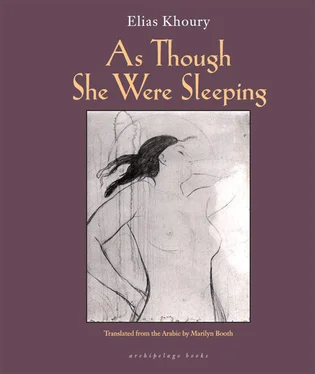Milia knew she was the only one to know the story. She knew it because she saw the blond officer whom her grandmother had buried deep and invisible in her breast. She saw him more than once, even, walking and stumbling just before he fell, clutching at a cushion there on the ground, becoming like Hasiba was in her final days, a mass of skin and bones practically severed at the middle and unable to move, her cough keeping her from breathing and curlicues of dried orange and lemon peel hanging on the opposite window. The woman preserved lemon and orange peel, spreading it over the line hanging in the garden until it dried and then used it for its fragrance. She let it glow in the oven and the house filled with the aroma of citrus. She put a flame to it and let it burn with the wood heating the bathwater, which turned the scent of orange. She would put it next to her pillow to breathe in the smell of life. When she became ill, all she wanted was dried fruit peel. She demanded it be hung on the iron bars of the window that faced her bed. After she lost speech, and after someone took down the peel from the window, three days passed and she began to moan and refused food until her son discovered the secret of her woe and returned the peel to the window.
Saadeh came to despise the smell of dried peel, especially in her mother-in-law’s final days when its aroma mingled with the odors of urine and feces. But she was helpless before her husband’s fierce wishes and Hasiba’s moans. In the end, burning all of the citrus peel she could find was not enough to satisfy Saadeh. From then on, having pickled lemons and the like in the house was a problem for her. No doubt that is why Milia perfected the art of cooking kibbeh arnabiyyeh — which required lots of pickled citrus — at the age of ten, transforming herself rather prematurely into mistress of the kitchen and doyenne of the sensual aromas of fine cuisine. She took her skills and her love of cooking with her to Nazareth only to find herself, ten months after marrying, forced to submit to the decision to leave. Milia was not granted the time necessary to become attached to Nazareth, the White City, or the Flower of Galilee as it was also called, with its three distinct parts all overlooking the fertile plains of Ibn Amir: the Greek Quarter, that of the Maronites, and the Latin Quarter. The entire town was perfumed with incense and poetry. No town, other than Beirut, was really known to Milia. Even in Beirut she knew only the area where they lived, the street where her grandmother Malakeh lived, the bakery that kneaded a tale of transient love, and the sea which frightened her before ever it entered her dreams as a route to faraway worlds.
Had she not felt so apprehensive, so fearful for the baby inside, Milia would not have opposed the move to Jaffa as strenuously as this. True, she had formed a strong and intimate bond between her pregnancy and the place: it was partly Nazareth’s sacred associations, partly those frequent dream-images of the blue woman, and partly the tang of discovering secret places that she savored in her meetings with Tanyous. But in the end, she knew, a woman must follow her husband to wherever it is that he wants her to go. Yet in Jaffa there was the fear, there were undertones of death, the faces of those blond men in the church. And there was the smell of oranges replete with intimations of dying. She wanted to tell Mansour the coffin dream in hopes it would deter him from the move. But the man no longer believed her dreams. She wrapped herself in her sadness, yielded to his fierce insistence, abided his anger, and lived her two final months of pregnancy more or less alone.
She saw Grandmama Hasiba in a dream. It happened in Nazareth. She saw Hasiba and there was the French officer standing to one side. His hands reached for the woman wrapped in black but the woman stayed where she was, standing at a distance, coming no nearer. Milia went up to the officer to tell him Hasiba had married and forgotten him. His beloved could not come to him now, anyway, because she lay in bed unable to move and incapable of speech. But the officer did not hear her, thought Milia, or perhaps he didn’t understand the words she said to him. In Beirut, Milia had never dreamed about her grandmother or the French officer. What had brought the two of them to Nazareth? Milia had been convinced that the officer had never existed and was merely a story that Hasiba had concocted to justify her slowness to marry, her rejection of suitors, and her withdrawal into her own solitary world. Milia dreamed of herself as a small girl in her room in Nazareth. The grandmother slept on Milia’s bed and the girl gazed out of the window, seeing Ferdinand in the distance, his hands out, leaning forward and then falling, and she was afraid. Mansour was not there to protect her from the creatures of the night.
When they married, Mansour described Palestine to her as a land governed by curses and sin. The fault is God’s, he said. No, he said. I’m wrong — and God forgive me if I’ve blasphemed. But human beings have never truly taken to heart the Almighty’s proclamation that one city out of the thousands that exist would be His, and that one tiny region — no bigger than a grain of wheat — would be the territory of His only son. All the wars have erupted here, and they still do — ever since Akhenaten the Egyptian realized that there is only one God. All eyes were turned to the land of Canaan because it was God’s land, and the wars began. Unending war, war after war. War will not stop until God decides either to let go of His city or to enter it. But this He will not do. Don’t be afraid — I am with you and I will not allow anything to touch you or harm you. This land is going to know many more wars but we will live far away from war. No one will dare spark off a war in Nazareth. We will live in Nazareth and peace will shade our lives.
Milia did not believe this story of peace but the man enfolded her in his words. Listening to him, she felt as though he were bearing her aloft, taking her with him as the poems he recited floated in front of her eyes tantalizingly, bringing together the two of them in a land of enchantment crafted by the man’s voice. She loved his voice, she told him, with its husky tinge evincing a brew of tobacco and coffee, its waves of tenderness swelling upward on the high seas of the ancient Arabic poetic meters, and its soft depth, which made her think of velvet. The voice carried her along, swimming through its worlds that drew her far away. And then suddenly she was discovering that this man concealed a momentous secret and had come to her to seek the refuge he believed she could provide. He promised her protection but in reality what he wanted was to travel inside the worlds she had made, so that he could skirt the dangers hovering darkly over Jaffa.
I am not objecting to going to Jaffa or anywhere else — wherever you want to go — but because of my pregnancy I cannot go right now.
Milia could appreciate the importance of keeping the iron foundry going in service to the city’s defense — this little city on whose bowed shoulders was growing a new city trying to swallow up the old one. Tel Aviv was an attempt to legitimize the Jews’ quest to occupy the whole country. She understood all of this. But she hated the violence and the blood and she was afraid for her son.
Had her grandfather not killed her father?
Why was she saying this when she knew full well that he hadn’t killed his son?
But he intended to kill him, Saadeh told her daughter. If it had not been for God’s mercy and the purity of his mother’s heart, the boy would have departed this world.
Did the man kill his son, or at least throw stones at him, because he did not know who it was, as he claimed? Anyway, this was not so important. The real question was: what was Milia’s link to her grandmother and to this foolish legendary tale that had transformed itself somehow into a memory wrapped in nebulous indistinct dreams? For after the death of Amin, the tale returned, as Jaffa’s phantoms invaded and occupied Milia’s life during the two final months of her pregnancy.
Читать дальше












